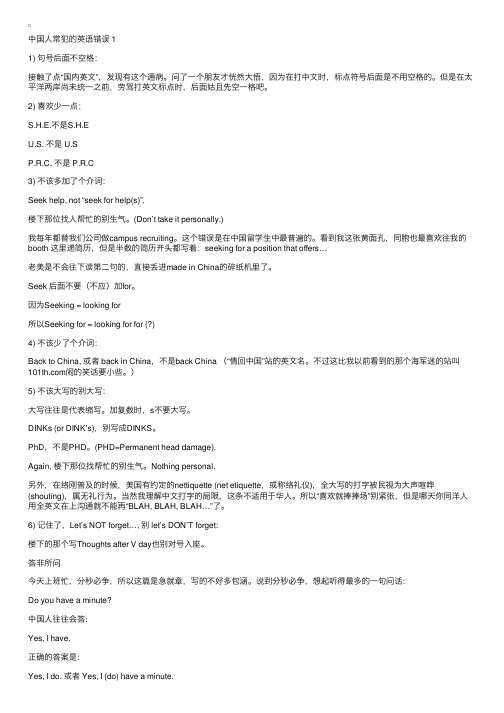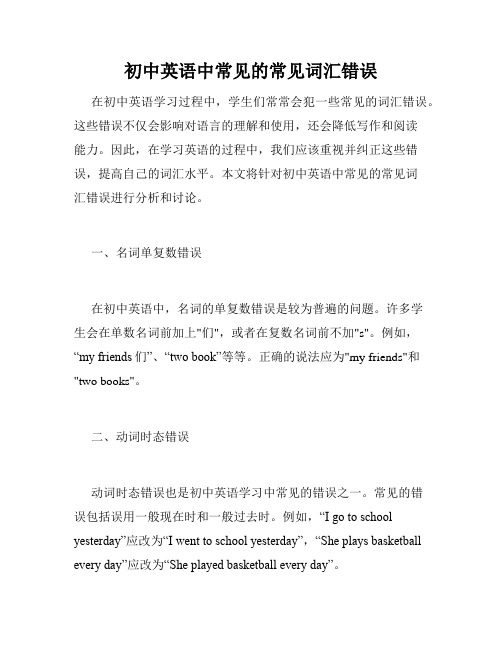你的英文错了吗?——中学生常犯的英语错误(2)
中学生英语学习常见错误 之二

中学生英语学习常见错误中学生英语学习常见错误---------------之二之二之二Ddance dance[误] We'll invite you and your wife to a dance party. We'll invite you and your wife to a dance party.[正] We'll invite you and your wife to a dancing party. We'll invite you and your wife to a dancing party.[正] We'll invite you and your wife to a dance. We'll invite you and your wife to a dance.[正] We'll invite you and your wife to a ball.( We'll invite you and your wife to a ball.(美语中常用美语中常用ball 作为舞会。
)date date[误] He studied ten hours a date. He studied ten hours a date.[正] He studied ten hours a day. He studied ten hours a day.[析] date 是指具体日期是指具体日期。
如问What's the date today? What's the date today? 应回答具体日期应回答具体日期应回答具体日期::"October 1st 1998.""October 1st 1998."而而day 是指1日(24小时小时))。
如What day is today? What day is today? 问的是问的是星期几星期几,,应回答应回答"It's Sunday.""It's Sunday.""It's Sunday."[误] Today's date is January first. 1998. Today's date is January first. 1998.[正] Today's date Today's date is January 1is January 1is January 1,, 1998. 1998.[正] Today's date is January 1st Today's date is January 1st,, 1998. 1998.[析] 在日期书写中不要用序数词全写在日期书写中不要用序数词全写,,而要用1st 1st,, 2nd 2nd,, 3rd 3rd………………如果一定如果一定要用序数词要用序数词,,其顺序应为其顺序应为::It is the first of January.It is the first of January.day day[误] This is a book about every day English. This is a book about every day English.[正] This is a book about everyday English. This is a book about everyday English.[正] This is an eve This is an everyday English book.ryday English book.ryday English book.[误] We go to school everyday. We go to school everyday.[正] We go to school every day. We go to school every day.[析] everyday 是形容词是形容词,,意为意为""日常的日常的"",而every day 则是则是""每天每天""、"天天天天""之意之意。
谈谈中学生英语常犯错误

谈谈中学生英语常犯的错误摘要:学习一门外语,我们需要注意两方面:一是减少母语(即第一语言)的干扰;二是形成新的语言习惯。
学生平时所犯的错误也不外乎这两点。
减少错误要依靠理解与记忆,既要理解错误的原因,更要逐步积累语言材料,真正养成用第二语言思维的习惯。
关键词:中学英语常见错误mistakes are the evidence of language learning .意思是:学一门外语总不免犯错误,犯错误的过程也即是逐步学会外语的过程。
所以犯错误是不值得奇怪的。
但在具体使用过程中,我们应该分析错误的原因,力争少犯错误,不犯错误。
学习一门外语,我们需要注意两方面:一是减少母语(即第一语言)的干扰;二是形成新的语言习惯。
学生平时所犯的错误也不外乎这两点。
减少错误要依靠理解与记忆,既要理解错误的原因,更要逐步积累语言材料,真正养成用第二语言思维的习惯。
这似乎听起来用英语思维(thinking in english)是高不可攀的,实际上,当我们学到一定程度,许多英语句子也无需再翻译了,是可以做到的。
同学们在使用英语过程中所犯的错误是千差万别的,主要表现在以下三个方面:一、习惯用法方面的错误对于这个问题,同学们是较难掌握的。
因为难就难在可能这个句子在语法上没有问题,可是就是不能这么说,它与我们汉语的表达方式不一样。
我们不能说出错误的原因,只能靠平时的日积月累,培养新的语感。
等我们学到一定程度,学习习惯也就养成了,一切问题也就解决了。
例如,don’t you mind lending me your book ? (你不反对把书借给我吧?)我们一定会说:奥,不反对。
yes ,i don’t。
(是的,我反对。
)这种答语是前后矛盾的。
一般习惯说法是,no,i don’t 。
所以同学们课下要多练习否定疑问句,习惯了就好了。
又如,我所有的学生都不喝酒。
(all my students don’t drink.不对,应说, none of my students drink. )因为在英语中,用all,every,both,any等词,其否定形式就和汉语的原意不相符了。
你的英文错了吗?——中学生常犯的英语错误(3)

1. I would be thankful if you took me to the airport.2. I don’t hope he’ll be here.3. These days’ weather is the most ideal for touring.4. In the air crash, three people were killed, one wounded.5. His speech lacks of humor.6. The last year was difficult, because I lost my job and had to do some odds to make a life.7. Could Monique come and live with us for a month?对一对:豁然开朗1. I would be grateful if you me to the airport.如果你能送我到机场,我不胜感激。
解:Grateful与thankful是同义词,有细微的差别,grateful指对某人感到“感激的,感谢的”,thankful指“欣慰的,宽慰的”,thankful接that从句时,指一件好的事情发生,或指因一件不好的事没有发生,而感到宽慰、高兴。
如:My parents feel thankful that I passed the exam.我通过了考试,我的父母感到欣慰。
2. I hope he won’t be here.我不希望他来这儿。
解:与think不同,在否定句中,not放在hope只有(hope…not),而不是放在hope的前面。
3. These days’ weather is ideal for touring.这几天的天气很适合去旅游。
解:Ideal, perfect等没有比较级、最高级的形式,不能用more/most/very/rather等修饰,因为ideal, perfect已经具备完美的含义。
中国人常犯的英语错误

中国⼈常犯的英语错误 11) 句号后⾯不空格:接触了点“国内英⽂”,发现有这个通病。
问了⼀个朋友才恍然⼤悟,因为在打中⽂时,标点符号后⾯是不⽤空格的。
但是在太平洋两岸尚未统⼀之前,劳驾打英⽂标点时,后⾯姑且先空⼀格吧。
2) 喜欢少⼀点:S.H.E.不是S.H.EU.S. 不是 U.SP.R.C. 不是 P.R.C3) 不该多加了个介词:Seek help, not “seek for help(s)”.楼下那位找⼈帮忙的别⽣⽓。
(Don’t take it personally.)我每年都替我们公司做campus recruiting。
这个错误是在中国留学⽣中最普遍的。
看到我这张黄⾯孔,同胞也最喜欢往我的booth 这⾥递简历,但是半数的简历开头都写着:seeking for a position that offers…⽼美是不会往下读第⼆句的,直接丢进made in China的碎纸机⾥了。
Seek 后⾯不要(不应)加for。
因为Seeking = looking for所以Seeking for = looking for for (?)4) 不该少了个介词:Back to China, 或者 back in China,不是back China (“情回中国”站的英⽂名。
不过这⽐我以前看到的那个海军迷的站叫闹的笑话要⼩些。
)5) 不该⼤写的别⼤写:⼤写往往是代表缩写。
加复数时,s不要⼤写。
DINKs (or DINK’s),别写成DINKS。
PhD,不是PHD。
(PHD=Permanent head damage).Again, 楼下那位找帮忙的别⽣⽓。
Nothing personal.另外,在络刚普及的时候,美国有约定的nettiquette (net etiquette,或称络礼仪),全⼤写的打字被民视为⼤声喧哗(shouting),属⽆礼⾏为。
当然我理解中⽂打字的局限,这条不适⽤于华⼈。
初中英语常见错误总结

初中英语常见错误总结在初中阶段,学生们开始接触英语,掌握基本的语法和词汇。
然而,由于学习时间短暂和知识储备不足,他们常常会犯一些常见的错误。
本文将总结一些初中英语中常见的错误,并提供一些纠正方法。
1. 时态错误在英语中,时态是非常重要的。
然而,许多初中生经常混淆不同的时态形式。
例如,他们经常将过去时和现在完成时混用。
正确的做法是,在描述过去发生的事情时使用过去时,而在强调过去的经历或对现在的影响时使用现在完成时。
2. 冠词错误冠词在英语中起着非常重要的作用,但初中生常常会在使用冠词时出错。
他们可能会忘记在特定情况下使用不定冠词"a"或"an",或者错误地使用定冠词"the"。
正确的做法是,在描述一般性的事物时使用不定冠词,而在特指某个事物时使用定冠词。
3. 主谓一致错误主谓一致是英语语法中常见的问题。
初中生可能会在主语和谓语动词之间出现不一致的情况。
例如,他们可能会说"he play football",而不是"he plays football"。
正确的做法是,在主语是第三人称单数时,谓语动词要加上"s"或"es"。
4. 词汇拼写错误词汇拼写是初中生经常犯的错误之一。
他们可能会在拼写单词时出现错别字或混淆相似的词汇。
为了避免这种错误,学生们应该多阅读,并使用拼写检查工具来纠正他们的错误。
5. 句子结构错误初中生有时会在句子结构上出现错误,导致句子不通顺或含义不清。
例如,他们可能会说"Yesterday I go to park",而不是"Yesterday I went to the park"。
正确的做法是,使用正确的时态和语序来构建句子。
6. 动词形式错误初中生可能会在使用动词时出现错误。
他们可能会使用动词的原形而不是正确的时态形式。
你的英文错了吗?——中学生常犯的英语错误(1)

1. Lucy will make arrangement for our trip to Washington, DC.2. Rodney left all his baggages at the airport.3. Yesterday I bought a wonderful book named World Talk, New Mother Goose.4. Due to the snowstorm, Kate canceled her date with Bing.5. We are considering to move to New York City.6. Mary keeps on smoking and drinking despite her doctor’s continuous warnings.7. It’s costly to eat out these days.8. The young couple seem to be very rich and happy.9. Lee has just received a bachelor degree of Chinese literature.10. The airplane crash is described in details in today’s newspaper.答案详解1. Lucy will make arrangements for our trip to Washington, DC.make (the) arrangements for sth.“为……做安排”。
2. Rodney left all his baggage at the airport.baggage美式英语,是不可数名词,没有复数形式。
3. Yesterday I bought a wonderful book called World Talk, New Mother Goose.当提到某个人或东西的名字时,通常用(be) called。
初中英语中常见的常见词汇错误

初中英语中常见的常见词汇错误在初中英语学习过程中,学生们常常会犯一些常见的词汇错误。
这些错误不仅会影响对语言的理解和使用,还会降低写作和阅读能力。
因此,在学习英语的过程中,我们应该重视并纠正这些错误,提高自己的词汇水平。
本文将针对初中英语中常见的常见词汇错误进行分析和讨论。
一、名词单复数错误在初中英语中,名词的单复数错误是较为普遍的问题。
许多学生会在单数名词前加上"们",或者在复数名词前不加"s"。
例如,“my friends们”、“two book”等等。
正确的说法应为"my friends"和"two books"。
二、动词时态错误动词时态错误也是初中英语学习中常见的错误之一。
常见的错误包括误用一般现在时和一般过去时。
例如,“I go to school yesterday”应改为“I went to school yesterday”,“She plays basketball every day”应改为“She played basketball every day”。
三、形容词和副词误用在初中英语中,形容词和副词的误用也比较常见。
有些学生会误把形容词用作副词的地方,或者反过来。
例如,“I feel bad”应该用副词形式,“I feel badly”,“He speaks quick”应改为“He speaks quickly”。
四、介词错误介词错误也是初中英语中常见的词汇错误之一。
学生们容易把介词与动词、名词搭配错误,造成语义上的混淆。
例如,“I am in the bed”应改为“I am on the bed”,“I am go to school”应改为“I go to school”。
五、冠词误用冠词误用也是初中英语学习中的常见错误。
学生们经常把不定冠词"a"和定冠词"the"使用错误,或者无意识地省略冠词。
中学生英语学习常见错误

中学生英语学习常见错误中学生英语学习常见错误[1]-名词[误]Please give me a paper.[正]Please give me a piece of paper.[析]不要认为可以数的名词就是可数名词,这种原因是对英语中可数与不可数名词的概念与中文中的能数与不能数相混淆了,所以造成了这样的错误,因paper在英语中是属于物质名词一类,是不可数名词。
而不可数名词要表达数量时,要用与之相关的量词来表达,如:two pieces of paper.[误]Please give me two letter papers.[正]Please give me two pieces of letter paper.[析]paper作为纸讲是不可数名词,而作为报纸、考卷、文章讲时则是可数名词,如:Each student should write a paper on what he has learnt.[误]My glasses is broken.[正]My glasses are broken.[误]I want to buy two shoes.[正]I want to buy two pairs of shoes.[析]英语中glasses—眼镜,shoes—鞋,trousers—裤子等由两部分组成的名词一般要用复数形式。
如果要表示一副眼镜应用a pair of glasses而这时的谓语动词应与量词相一致。
如:This pair of glasses is very good. [误]May I borrow two radioes?[正]May I borrow two radios?[析]以o结尾的名词大都是用加es来表示其复数形式,但如果o前面是一个元音字母或外来语时则只加s就可以了。
这样的词有zoo—zoos,piano—pianos.[误]This is a Mary's dictionary.[正]This is Mary's dictionary.[析]如名词前有指示代词this, that, these those,及其他修饰词our,some, every, which, 或所有格时,则不要再加冠词。
- 1、下载文档前请自行甄别文档内容的完整性,平台不提供额外的编辑、内容补充、找答案等附加服务。
- 2、"仅部分预览"的文档,不可在线预览部分如存在完整性等问题,可反馈申请退款(可完整预览的文档不适用该条件!)。
- 3、如文档侵犯您的权益,请联系客服反馈,我们会尽快为您处理(人工客服工作时间:9:00-18:30)。
1. Did you get any difficulty to get the information from her?
2. Lyn did not like that movie, because she’s disinterested in comedies.
3. Frank lives in a hotel now in downtown.
4. He is optimistic about his country’s economical prospects.
5. This company is expected development this year.
6. I’ll wait for you for supper at six tonight.
7. You need to pay one-dollar parking fee.
8. This see-through style doesn’t fit me at all.
9. Today my boss spoke to me very friendly.
10. How is your life after school like?
对一对:豁然开朗
1. Did you have any difficulty (in) getting the information from her?
在某方面有困难用介词in,不用不定式。
2. Lyn did not like that movie, because she’s uninterested in comedies.
Uninterested的意思是“不感兴趣的,厌倦的”(not interested, bored),而disinterested指“中立的,无偏见的”(impartial, neutral)。
3. Frank lives in a hotel downtown now.
downtown在这里作副词(在市区),不是名词,所以不能加介词in。
downtown还可以作形容词,如:He lives in a downtown hotel.
4. He is optimistic about his country’s economic prospects.
Economic指“经济上的”,economical指某人“节俭的”或某个东西“便宜的”。
如:economic theory经济理论/an economic little car一辆省油的小汽车。
5. The company expects development this year.
在这里,expect作不及物动词,主语为the company,不能用被动语态。
6. I’ll expect you for supper at six tonight.
Wait for指“等候”,暗示耽误,强调时间的流逝。
这句话里指明了时间,所以就不是wait,而应该是expect,表示“期待,盼望”。
如果没有具体的时间,就可以用wait,如I’ll wait for you for supper tonight.
7. You need to pay a one-dollar parking fee.
Fee是可数名词,所以在这里要加冠词a。
8. The see-through style doesn’t suit me at all.
当说The clothes fit me时,指衣服尺码合适;当说The clothes suit me时,指款式或颜色合适。
9. Today my boss spoke to me in a very friendly way./Today my boss was very friendly when talking to me.
Friendly是形容词,不是副词,不能修饰动词。
类似的形容词还有:cowardly胆小的,deadly致命的,极度的,likely可能的,lonely孤独的,lovely可爱的。
10. What is your life after school like?
在询问一个人或一个物像什么样子,或者对人或事物的性质进行提问时,用what…like,而不是how。
How用来问候某人的健康、进步、变化的事情的进展等?注意,在how后面没有like。
